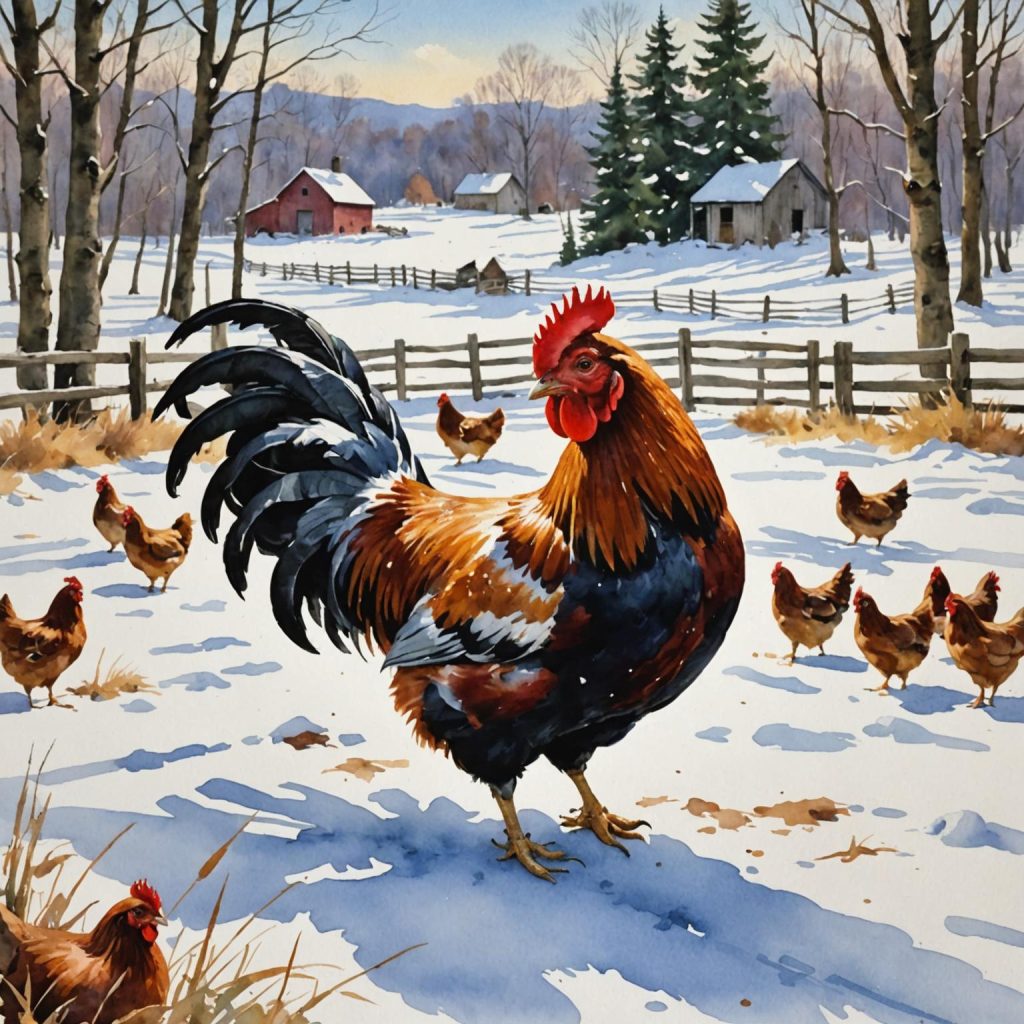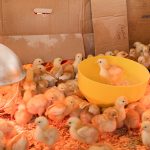Chickens, like all animals, have specific needs that must be met in order for them to thrive, especially during the winter months. Understanding these needs is crucial for ensuring the health and well-being of your flock. Chickens are more susceptible to cold temperatures than many other animals, as they lack the ability to regulate their body temperature as effectively. This means that they require proper shelter, bedding, nutrition, and hydration to stay healthy during the winter. Additionally, chickens are at risk for frostbite and respiratory issues in cold weather, so it is important to take steps to protect them from these potential dangers. By understanding the specific needs of chickens in the winter, you can take the necessary steps to ensure that your flock stays healthy and happy throughout the colder months.
Chickens require a warm and dry environment to thrive in the winter. This means providing them with proper shelter and bedding to keep them comfortable and protected from the elements. Additionally, chickens need a balanced diet and access to clean water to stay healthy during the winter months. It is also important to monitor your flock for signs of cold stress and to be prepared for potential winter storms and emergencies. By understanding and addressing the specific needs of chickens in the winter, you can help ensure that your flock stays healthy and happy throughout the colder months.
Table of Contents
Providing Proper Shelter and Bedding
Proper shelter is essential for keeping chickens healthy and comfortable during the winter months. A well-constructed coop with adequate insulation and ventilation will help protect your flock from the cold and dampness. It is important to ensure that the coop is free from drafts and leaks, as these can lead to cold stress and respiratory issues in chickens. Additionally, providing your flock with plenty of clean, dry bedding will help keep them warm and comfortable. Straw or wood shavings are good options for bedding, as they provide insulation and absorb moisture. It is important to regularly clean and replace bedding to prevent the buildup of moisture, which can lead to frostbite and respiratory issues in chickens.
In addition to providing proper shelter and bedding, it is important to consider the size of your flock when designing your coop. Overcrowding can lead to increased moisture and ammonia levels, which can be harmful to your chickens’ respiratory health. Providing adequate space for your flock will help reduce the risk of these issues. It is also important to consider the placement of your coop in relation to the sun and prevailing winds. Placing the coop in a sunny, sheltered location will help keep it warm and dry, while also providing protection from harsh winter winds. By providing proper shelter and bedding for your flock, you can help ensure that they stay healthy and comfortable throughout the winter months.
Ensuring Adequate Nutrition and Hydration
Proper nutrition is essential for keeping chickens healthy during the winter months. A balanced diet that includes a mix of grains, protein, vitamins, and minerals will help keep your flock in good condition. It is important to provide your chickens with access to fresh water at all times, as dehydration can be a serious issue in cold weather. In addition to their regular feed, chickens may benefit from supplemental treats such as scratch grains or mealworms during the winter months. These treats can provide extra energy and warmth for your flock, helping them stay healthy and active during the colder months.
In addition to providing a balanced diet, it is important to ensure that your chickens have access to clean water at all times. In cold weather, water can freeze quickly, so it is important to check waterers regularly and provide a heated water source if necessary. Dehydration can be a serious issue for chickens in cold weather, so it is important to take steps to ensure that they have access to fresh water at all times. By ensuring adequate nutrition and hydration for your flock, you can help keep them healthy and happy throughout the winter months.
Protecting Against Frostbite and Respiratory Issues
Chickens are at risk for frostbite and respiratory issues in cold weather, so it is important to take steps to protect them from these potential dangers. Frostbite occurs when the comb, wattles, or feet of a chicken are exposed to freezing temperatures for an extended period of time. To prevent frostbite, it is important to provide your flock with proper shelter and bedding, as well as access to clean water at all times. Additionally, applying petroleum jelly or other protective ointments to your chickens’ combs and wattles can help prevent frostbite in extremely cold weather.
Respiratory issues can also be a concern for chickens in cold weather. Ammonia buildup from soiled bedding or poor ventilation can lead to respiratory problems in chickens, so it is important to keep the coop clean and well-ventilated. Additionally, avoiding overcrowding and providing adequate space for your flock can help reduce the risk of respiratory issues. By taking steps to protect your flock from frostbite and respiratory issues, you can help ensure that they stay healthy and comfortable throughout the winter months.
Implementing Safe Heating Options
While proper shelter and bedding are essential for keeping chickens warm in the winter, some flocks may benefit from supplemental heating options. However, it is important to implement these options safely, as improper heating methods can pose a fire hazard or lead to carbon monoxide poisoning. If you choose to use a heat lamp or other heating device in your coop, it is important to ensure that it is securely installed and placed out of reach of your chickens. Additionally, it is important to regularly check heating devices for signs of wear or damage, as well as to monitor the temperature in the coop to prevent overheating.
In addition to supplemental heating options, there are other ways to help keep your flock warm in the winter. Providing extra insulation in the coop, such as adding additional bedding or insulating walls, can help retain heat and keep your chickens comfortable. Additionally, allowing your chickens access to sunlight during the day can help keep them warm naturally. By implementing safe heating options and other methods for keeping your flock warm in the winter, you can help ensure that they stay healthy and comfortable throughout the colder months.
Monitoring the Flock for Signs of Cold Stress
It is important to monitor your flock for signs of cold stress during the winter months. Cold stress occurs when chickens are exposed to temperatures that are too low for their comfort level, leading to decreased egg production, weight loss, or even death in severe cases. Signs of cold stress in chickens may include huddling together for warmth, decreased activity levels, or shivering. If you notice any of these signs in your flock, it is important to take steps to address the issue and keep your chickens warm and comfortable.
In addition to monitoring for signs of cold stress, it is important to regularly check your flock for any signs of frostbite or respiratory issues. Checking your chickens’ combs, wattles, feet, and legs for signs of frostbite can help prevent serious injury or infection. Additionally, monitoring your flock for any signs of respiratory distress, such as coughing or wheezing, can help catch potential issues early on. By monitoring your flock for signs of cold stress and other potential issues, you can take steps to keep them healthy and comfortable throughout the winter months.
Preparing for Potential Winter Storms and Emergencies
Winter storms and emergencies can pose serious risks for chickens, so it is important to be prepared for these situations. In the event of a winter storm or power outage, it is important to have a plan in place for keeping your flock safe and comfortable. This may include having backup heating options available, as well as ensuring that your coop is secure and well-insulated against harsh weather conditions. Additionally, it is important to have a plan for providing food and water for your flock in the event of an emergency.
In addition to preparing for potential winter storms and emergencies, it is important to have a plan for transporting or evacuating your flock if necessary. This may include having a designated emergency shelter or transportation method available in case of severe weather conditions. It is also important to have a plan for communicating with local authorities or neighbors in case of an emergency situation. By being prepared for potential winter storms and emergencies, you can help ensure that your flock stays safe and healthy throughout the colder months.
In conclusion, understanding the specific needs of chickens in the winter is crucial for ensuring their health and well-being during the colder months. By providing proper shelter and bedding, ensuring adequate nutrition and hydration, protecting against frostbite and respiratory issues, implementing safe heating options, monitoring for signs of cold stress, and preparing for potential winter storms and emergencies, you can help ensure that your flock stays healthy and happy throughout the winter months. Taking these steps will not only benefit your chickens but also provide you with peace of mind knowing that you are doing everything you can to care for your flock during the colder months.
Meet Walter, the feathered-friend fanatic of Florida! Nestled in the sunshine state, Walter struts through life with his feathered companions, clucking his way to happiness. With a coop that’s fancier than a five-star hotel, he’s the Don Juan of the chicken world. When he’s not teaching his hens to do the cha-cha, you’ll find him in a heated debate with his prized rooster, Sir Clucks-a-Lot. Walter’s poultry passion is no yolk; he’s the sunny-side-up guy you never knew you needed in your flock of friends!







